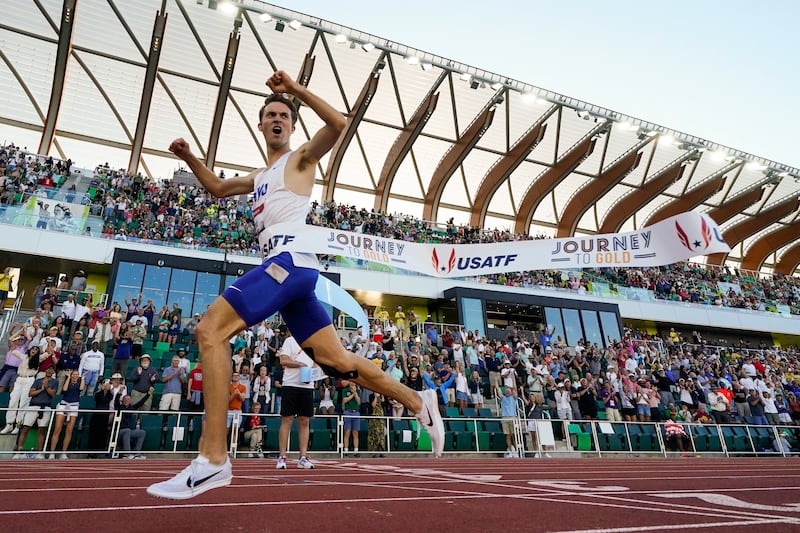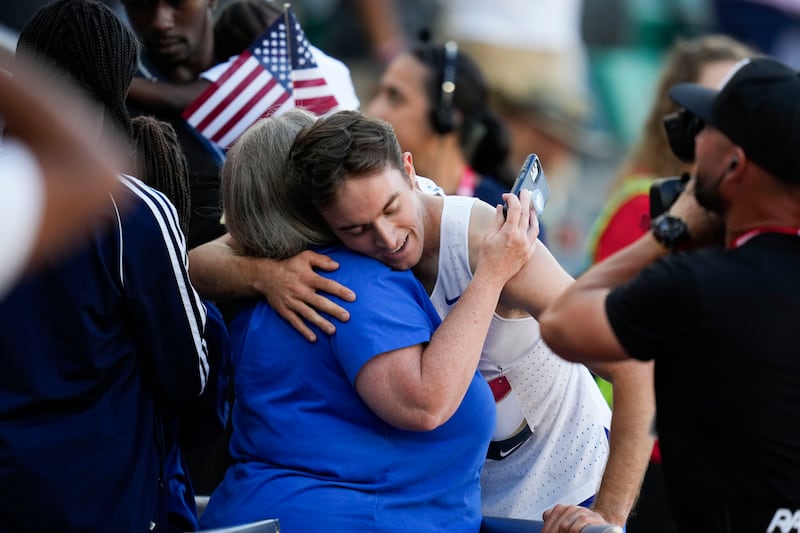Henry Marsh has been there and done that. His running shoes have taken him around the world and as he watches another BYU star preparing to do the same, the four-time Olympian couldn’t be happier.
“When he made the comment about being in ‘Henry Marsh mode’ that was very flattering and kind of him. He handled it really well. My big question is how fast would he have run had he not fallen?” — Henry Marsh on Kenneth Rooks
“Kenneth Rooks is a great runner. He has the ‘it’ factor,” said Marsh. “I am so impressed with what he’s done.”
Rooks will begin his training next week for next month’s World Track and Field Championships (Aug. 19-27) in Budapest, Hungary. The BYU junior fell during Saturday’s steeplechase at the USA Championships in Eugene, Oregon, only to get up and win the race in amazing fashion.
After taking a victory lap, the current NCAA steeplechase champion told reporters he was inspired by the way Marsh ran his races — decades before he was born.
“He used to go out at the back of the pack at the beginning of races and slowly move his way up. He would run at his own pace and within himself,” Rooks said. “That came into my mind, too, that I needed to run like Henry Marsh.”
Rooks got back on his feet, kept his own pace, and over the next five laps proceeded to pass all 13 runners who had gone out ahead of him during the fall. He won the race in a personal best 8.16.78.
“When he made the comment about being in ‘Henry Marsh mode’ that was very flattering and kind of him,” Marsh said. “He handled it really well. My big question is how fast would he have run had he not fallen?”
This was the second race where Rooks turned in a time faster than Marsh’s school record 8.21.60 — a record that lasted 47 years until the junior engineering student from Walla Walla, Washington, ran past it in early May.
“It’s fun to see (Rooks’) development,” said BYU track and field head coach Ed Eyestone. “Not only to win the NCAAs, but to go to the USAs and beat the pros is great. It puts him on the right track. He’s in a good place to make the Olympic team and I don’t think he has had his best run yet.”
Marsh agrees.
“I see much of him in me,” said the five-time BYU All-American. “I don’t limit him. I think he’s got a great future. He is just scratching the surface.”
The making of a legend
Running began for Marsh in the ninth grade at Northwood Junior High in the Dallas suburb of Richardson, Texas. After quarterbacking his team to an 0-10 record, Marsh left football and turned his attention to the dirt track behind the school.

“That year I broke the city record with a 3:25 time in the three-quarter mile and started my running career,” Marsh said.
After a freshman year on the track team at BYU, Marsh left on a mission to Brazil for The Church of Jesus Christ of Latter-day Saints. He put all running on hold for an entire year until one afternoon when he and his companion were out knocking on doors.
“We came across a local track club. I asked my mission president if I could run with those guys, and he said ‘Yes,’” Marsh said. “I started running with them and they were invited to compete in the Brazilian National Club Championships just outside the mission in Sao Paulo.”
With his president’s approval, Marsh crossed the boundaries to run the steeplechase and finished in second place with 9:25.
“In hindsight, if I hadn’t done that, if my president hadn’t been inspired to let me do it, I wouldn’t have made the Olympic team,” Marsh said.
Olympic march
Believing that BYU had given up on him, the 5-foot-10, 163-pound sophomore returned to school to find his half-scholarship gone. Even more determined, he decided to join the track team as a walk-on and pay his own way.
In his first post-mission race, Marsh ran an 8:55 to qualify for the NCAAs. His time was 30 seconds faster than his run in Brazil just months before. Marsh did even better at the NCAAs with an 8:27, breaking the school record by 14 seconds and qualifying for the Olympic trials.
“On the flight home, coach (Clarence) Robinson pulled me aside and said, ‘Henry, have you thought about the Olympics?’ I said, ‘Who me, coach? The one who is not on a scholarship?’” Marsh reflected. “Right then he said, ‘You got one. Full ride.’”
Not even a year removed from his mission, Marsh earned a roster spot and was running for the United States at the 1976 Olympics.
Marsh reached the finals and as he prepared for the race, he noticed a chant growing in the crowd.
“I heard all of these people saying, ‘Go Marsh!’ which was strange because I had never competed internationally before,” he said.
The ego boost didn’t last long. Marsh learned that McDonald’s was staging a promotion that had an Olympic event on a coupon and if an American won a gold medal, you got a free Big Mac. A silver medal produced a free cheeseburger and bronze got you French fries.
Marsh ran the second-fastest time in American history, but 8:23.99 was only good enough for 10th place — off the medal stand and out of McDonald’s.
Need for speed
Rooks may have erased Marsh’s running marks at BYU, but he has a way to go to match his legacy. Marsh is a nine-time U.S. national champion. He set the American steeplechase record four times and was ranked the No. 1 steeplechaser in the world in 1981, 1982 and 1985.

Seven years after he left Provo, Marsh ran even faster. He clocked his personal best and new American record 8:09.17 in West Germany in 1985. He knows Rooks can get faster and he will have to for next month’s world championships and every race after it.
“The World Championships is a totally different game,” Marsh said. “I don’t know what (Rooks’) upside is. I don’t think he knows. I wouldn’t be surprised to see him run in the low teens, given the right conditions.”
Marsh, who lives in Twin Falls, Idaho, has run all over Europe, including Budapest.
“They run fast times over there. The conditions are typically good,” he said. “Track fans are knowledgeable. The environment is conducive to fast times. There are guys that have run sub-8.”
Ethiopia’s Lamecha Girma holds the current world record at 7:52.11.
“He’s not there, but he has potential to get there in the coming years,” Marsh said. “But I don’t see any reason why he couldn’t make the finals.”
Marsh was a confident runner in his day, but he has no problem watching Rooks run past his records. Runners are faster today.
“Absolutely!” he said. “There is better technology, better training. Ken is a faster runner than I was. I’ve given him a couple of pointers, but he’s a winner. I think he will run well.”




